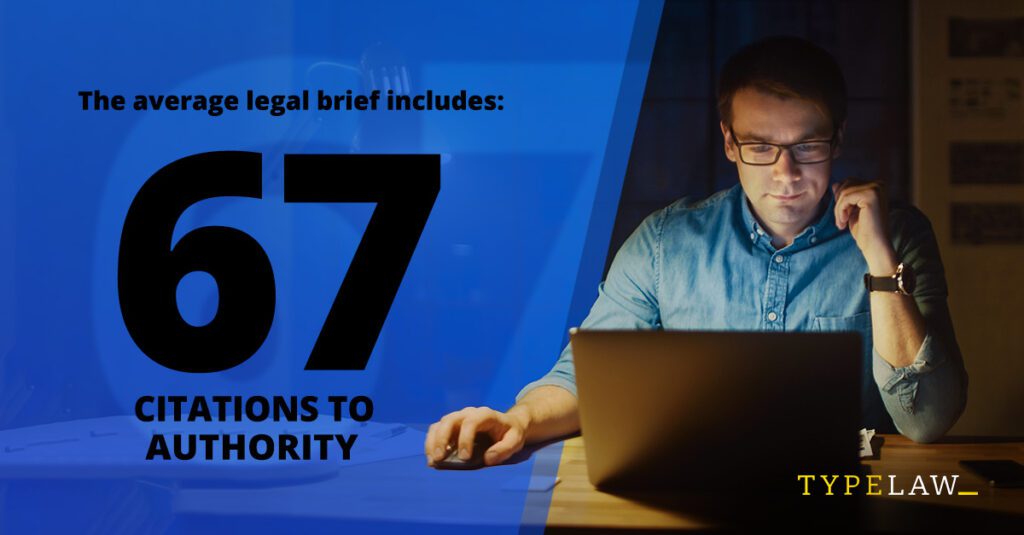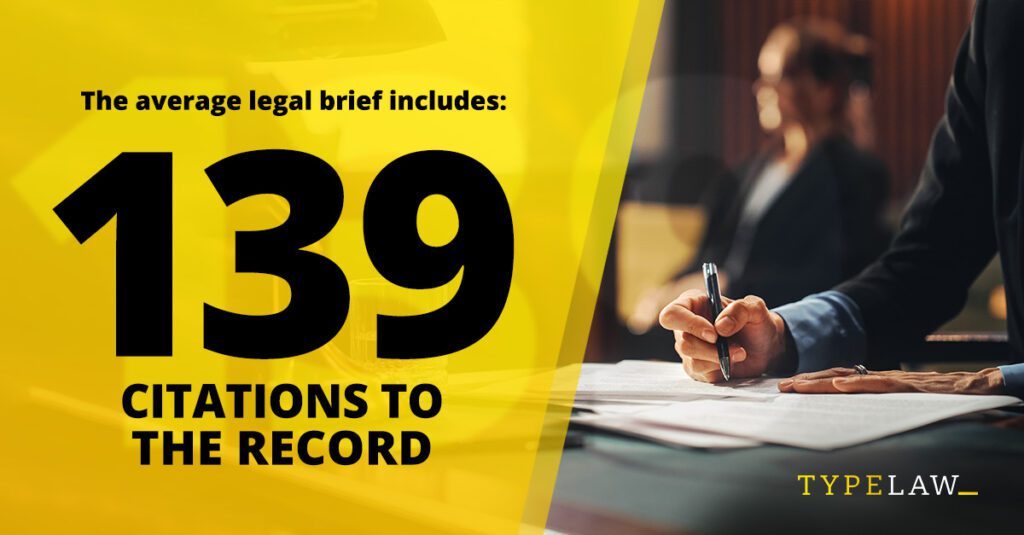The role of citations in a legal brief
When writing a legal brief, lawyers use citations to scaffold a grounded, credible argument that persuades the reader to adopt their point of view. Relevant, accurate, perfectly formatted citations are a mark of an attorney’s professionalism and credibility.
Courts prefer hyperlinked briefs
Hyperlinking citations in your legal brief makes it easier for the reader to seamlessly follow your argument, without interrupting their flow to go look up each case or authority you cite in a separate system.
Hyperlinks are also becoming increasingly important as more courts now prefer or require them. We’ve compiled this handy guide to hyperlink requirements and preferences by state and federal court.
The difference between hyperlinks to the record and authority
You can use citation hyperlinks in two different ways: linking to authority or to the record. Our Anatomy of a Legal Brief research (a detailed analysis of more than 10,000 briefs) found that the average brief includes 67 citations to authority and 139 citations to the record.

Hyperlink citations to authority
Hyperlinks to authority are links to external sources, such as case law, statutes, regulations, and other legal materials that support the argument being made in the brief. These hyperlinks are used to provide readers with direct access to the relevant legal authorities and enable them to verify the accuracy of your cited sources.
Hyperlinks to authority can be very helpful for judges, lawyers, and other legal professionals who need to quickly access and review the relevant legal materials.
Hyperlink citations to the record
On the other hand, hyperlinks to the record are links to internal documents and exhibits that have been filed with the court as part of the case record. These hyperlinks are used to provide readers with direct access to the evidence and other materials that support the argument being made in the brief.
Hyperlinks to the record can be very helpful for judges and other legal professionals who need to quickly access and review the evidence and other materials that you’re citing in your brief.

In summary, hyperlinks to authority provide access to external legal sources that support the argument being made in your brief, while hyperlinks to the record provide access to internal documents and exhibits that are part of the case record and support the argument in your brief.
5 reasons pin cites are important in a legal brief
Beyond just hyperlinking citations, attorney should relentlessly pin cite authority in a legal brief for several reasons:
1. Persuasion: When you’re making an argument in a legal brief, you want to persuade the judge or the opposing counsel that your position is correct. Pin citing authority can help you accomplish this by providing specific references to cases, statutes, and other legal sources that support your argument. By doing so, you make it clear that your argument is grounded in legal precedent and has a solid foundation.
2. Focus: If the judge needs to stop reading mid-brief to search and pull up the case you’re citing…then find the specific paragraph within that case…you’ve immediately lost their attention and focus on your argument. Once they get back to reading your brief, they’ve likely lost the flow.
This video highlights how pin-cite hyperlinking keeps the court focused on the flow of your argument and improves the reader experience:
3. Accuracy: Pin citing authority ensures that the legal authority you’re relying on is accurate and up-to-date. It allows the reader to easily verify the sources you’re citing and check for any updates or changes in the law.
Verifying citations becomes increasingly important as the use of generative AI expands, since AI is prone to hallucinations, AKA, making up cases.
These examples of lawyers caught citing fake cases demonstrate the risk of relying on generative AI when drafting your brief.

4. Credibility: By pin citing authority, you demonstrate to the reader that you’ve done your research and are well-versed in the relevant legal authority. This can help establish your credibility with the judge or opposing counsel, and make it more likely that they will take your argument seriously.
To put your best foot forward with the court, it’s also important that you properly format all your citations according to either the relevant local style manual or Bluebook.
5. Organization: Pin citing authority also helps you organize your argument and ensure that you’re covering all the relevant legal sources. By breaking down your argument into specific citations and authorities, you can make sure that you’re not missing any important legal points or overlooking key cases.
Overall, pin citing authority is an essential part of crafting a strong and persuasive legal brief. It helps establish your credibility, ensure accuracy, and strong organization, while also making sure that your argument is based on solid legal precedent.
Use legaltech tools to format & hyperlink citations automatically
Today, legaltech tools have emerged to help attorneys automatically format citations to comply with local rules of court and accurately hyperlink citations to authority and to the record in just a few clicks. AI automation-driven tools, such as TypeLaw, make it fast and easy to deliver an impressive work product—without all the typical frustration and time investment.
See how TypeLaw automatic citation formatting and hyperlinking can save you time and improve the accuracy of your next brief.